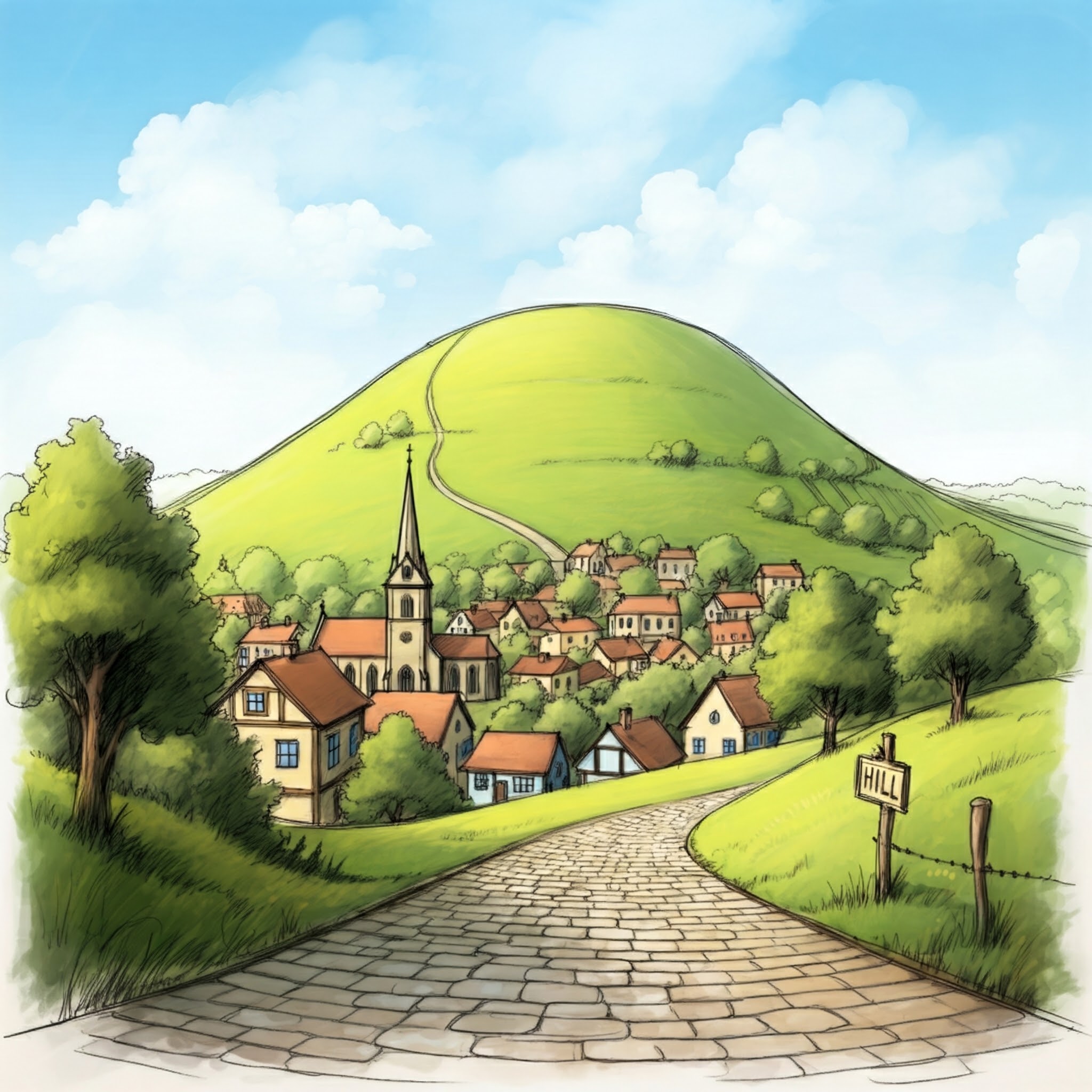Hill
Definition
Hill is a noun and a verb. As a noun, it refers to a natural elevation of the earth’s surface, smaller than a mountain. As a verb (less common), it means to form or heap up earth into a mound or ridge.
Parts of Speech
- Noun
- Verb
Pronunciation
American English
- IPA Pronunciation: /hɪl/
- Respelling: HIL
British English
- IPA Pronunciation: /hɪl/
- Respelling: HIL
Etymology
The word "hill" originates from Old English "hyll," meaning "small mountain or elevation." It is derived from Proto-Germanic "*hulni" and Proto-Indo-European "*keln-" (to rise or project). The term has been used in English since the early medieval period to describe natural landforms.
Derivatives
- Hilly (adjective)
- Hillock (noun)
- Hilltop (noun)
- Hilled (verb, past tense)
- Uphill (adverb/adjective)
Synonyms
- Mound
- Knoll
- Rise
Antonyms
- Valley
- Plain
- None
Usage
The noun "hill" is commonly used in contexts such as "The children climbed the hill to reach the playground." The verb form is less common but can be found in agricultural settings, e.g., "The farmers hilled the soil around the plants."
Related Terms
- Mountain: A larger and more prominent natural elevation.
- Elevation: The height above a given level, especially sea level.
- Ridge: A long, narrow, elevated landform.
Detailed Definitions
Noun
- A natural elevation of the earth’s surface: Refers to landforms smaller than mountains.
- Example: "The town is situated at the foot of a hill."
- An artificial mound or heap: Used to describe piles or raised structures.
- Example: "They built a hill for landscaping."
Verb
- To form or heap up earth into a mound: Refers to piling soil, often in gardening or agriculture.
- Example: "The workers hilled the dirt around the roots."
hill



🇨🇳 Mandarin
- 小山 (xiǎo shān)
- IPA Pronunciation: /ɕjɑʊ ʂan/
- Respelling: shyou-shan
🇮🇳 Hindi
- पहाड़ी (Pahāṛī)
- IPA Pronunciation: /pəɦaːɽiː/
- Respelling: pa-haa-ri
🇪🇸 Spanish
- Colina
- IPA Pronunciation: /koˈlina/
- Respelling: ko-LEE-na
🇫🇷 French
- Colline
- IPA Pronunciation: /kɔ.lin/
- Respelling: ko-leen
🇸🇦 Modern Standard Arabic
- تل (Tal)
- IPA Pronunciation: /tʕal/
- Respelling: tal
🇧🇩 Bengali
- পাহাড় (Pāhaṛa)
- IPA Pronunciation: /pɑɦaɽ/
- Respelling: paa-ha-ra
🇷🇺 Russian
- Холм (Kholm)
- IPA Pronunciation: /xolm/
- Respelling: kholm
🇵🇹 Portuguese
- Colina
- IPA Pronunciation: /kuˈlinɐ/
- Respelling: ku-LEE-na
🇮🇩 Indonesian
- Bukit
- IPA Pronunciation: /bukit/
- Respelling: boo-kit
🇩🇪 German
- Hügel
- IPA Pronunciation: /ˈhyːɡəl/
- Respelling: hue-gel
🇯🇵 Japanese
- 丘 (Oka)
- IPA Pronunciation: /oka/
- Respelling: o-ka
🇻🇳 Vietnamese
- Đồi
- IPA Pronunciation: /ɗo˧ˀ˦ʔi/
- Respelling: doy
🇰🇷 Korean
- 언덕 (eondeok)
- IPA Pronunciation: /ʌndʌk̚/
- Respelling: un-deok
🇹🇷 Turkish
- Tepe
- IPA Pronunciation: /tepe/
- Respelling: te-pe
🇵🇰 Urdu
- پہاڑی (Pahāṛī)
- IPA Pronunciation: /pəɦaːɽiː/
- Respelling: pa-haa-ri





